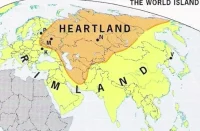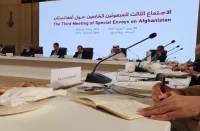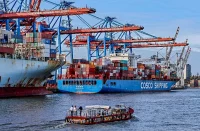Najmuddin A. SHAIKH (Pakistan)
Buoyed by his domestic triumph – the passage of the Healthcare Bill – and the conclusion of the new START treaty with Russia- marking a substantial advance towards his oft touted goal of a Nuclear weapon free world President Obama arrived in Kabul on a previously unannounced visit. Ostensibly the visit was meant to bolster the morale of the American troops in Afghanistan – an inescapable need for a wartime President. This purpose was well served by the rousing speech he gave to a large gathering of American servicemen at Bagram but there is no doubt that the real purpose of his visit was to lay out to President Karzai and his colleagues in sharp and unambiguous terms the American expectation that Karzai would work harder to eliminate corruption and provide better governance.
The visit occurred against the backdrop of reports that President Obama had cancelled an invitation to President Karzai to visit Washington after Karzai had tried to promulgate a new law giving himself the authority to nominate all the members of the Electoral Complaints Commission, all of whom the decree stated would be Afghan thus changing the present practice of having the UN nominate three of the 5 members of the Commission. American media reports maintained that in retaliation Karzai invited President Ahmadinejad to Kabul and stood by his side while, in a scathing speech in Kabul Ahmadinejad berated the United States and attributed Afghanistan’s problems to the presence of foreign forces. The American media suggested that the visit Karzai undertook to China immediately thereafter was also designed to win himself some other external support as he sought to distance himself from his western benefactors.
These reports appear to be much exaggerated. Ahmadinejad had, it seems, been invited long before the decree crisis and his visit was, in fact, postponed by a day to accommodate the visit of the American Secretary of Defence Robert Gates. The visit to China similarly was clearly designed to attract further Chinese investment in the exploration and exploitation of Afghanistan’s natural resources and was no doubt encouraged by the large investment that China had made already in the risky but profitable Aynak Copper mine project. It was unlikely that Karzai genuinely expected China to be a replacement for the western alliance. In any case during the Obama visit it was also announced that Karzai had been invited to the White House on the 12th May.
Immediately after Obama’s visit the lower house of the Afghan Parliament rejected by a large margin Karzai’s decree and thus asked for the retention of the original composition of the Complaints Commission. Legal experts had in any case questioned the validity of the Karzai decree since the Afghan election Law forbade any changes in the law in the year before an election. The rejection by the lower house had also to win the endorsement of the Upper house where Karzai had a greater base of support. A measure of confusion therefore exists on what the exact legal position is. There is no doubt however that Karzai believed the vote against his decree had been engineered by the Americans and was meant to prevent the consolidation of the power base he hoped to create in the new parliament in the forthcoming elections.
His somewhat wild accusations that Galbraith and other western representatives were responsible for the election fraud and that “”They wanted to have a puppet government. They wanted a servant government” may have been driven by this perception but this to my mind was not the main reason for his lashing out against his American and western allies.
His outburst, perhaps more calculated than was immediately apparent, was probably prompted by the demand, which, I believe, President Obama made that in preparation for the military assault on Kandahar that the Americans intended launching President Karzai should move his half-brother, Ahmad Wali Karzai out of Kandahar and allow a share of power in the administration to tribes other than the Durranis and the Popalzais. That this was the demand became evident when Admiral Mullen visited Kabul the day after Obama and stated publicly “We will be unable to succeed in Kandahar if we cannot eliminate a vast majority of corruption there and set up a legitimate governance structure”. In response to a question about sidelining Ahmad Wali, he said that “”I think that’s something that President Karzai is going to have to figure out … addressing the corruption and governance issues in Kandahar. It’s not for us to figure out.” Another military officer however was blunter stating, “We’d rather not have a guy (Ahmad Wali) like that down there because he’s so divisive. But there’s nothing that we can do unless we can link him to the insurgency, then we can put him on the (target list) and capture and kill him.” (1)
Over the last few days there has been a concerted effort on the part of the Americans to paper over their differences with Karzai and to reassure him that they view him as a partner if not as an ally. There is no longer talk of getting rid of Ahmad Wali. Karzai in turn has bowed to demands for removing (through resignation) the officials of the independent Election Commission who were held responsible by western observers for the electoral fraud and has been accompanying Gen. McChrystal to Kandahar to talk to tribal leaders and to hear their grievances and to build the “hearts and minds” campaign which alone can give durability to the military victory that the Americans are likely to win in Kandahar when they start the military operation in June or July.
The outlook for Afghanistan continues to be bleak. In Marjah where the military operation was completed in February a durable peace a competent administration has yet to be established. As the poppy harvesting season approaches the Americans have now decided to pay $ 300 per hectare to farmers who plough under their standing poppy crop. This is of course far less than the value of the crop in the open market but given the interdiction of migrant workers entering the area to harvest the crop the farmers may well agree. This will be good news for the drug dealers since according to the UNODC estimates in 2009 they have some 10,000 tons of opium in stock and would therefore welcome any measure that reduced the amount of opium coming on to the market. Money is being poured into Marjah-every worker on projects that have been generated is being paid $5 a day but the Taliban remain an intimidating factor. The locals are not yet sure enough of the resolve of the occupation force or of the limited local government that has been put in place to resist the Taliban pressures and threats.
The charges of corruption against the Karzai administration and against Ahmad Wali in Kandahar may well be true but the fact is that much of the corruption can only be controlled by those who are disbursing funds. In the Rehearsal of Concept conference that was held in Kabul a few days ago under the leadership of Hobrooke and Petraeus, it emerged that of the total aid only 8.8% was being channelled through the Afghan government till last year and is currently at 13.5% which may rise to 20% by the end of the year. Various investigative reports in the American media have established that large sums of money are paid by US military contractors to the Taliban or their front men to ensure the safety of the supplies that are moved into Afghansitan to support the American and ISAF forces. This is corruption by the western powers and not the Afghans.
Good governance and the elimination of corruption will take time in the best of circumstances and the circumstances in Afghanistan are not good. The Americans must accept that reconciliation is going to be the only route that can bring a modicum of peace to Afghanistan. In Kandahar Wali canot be forced to step down but he can be persuaded to share power with the other tribes that have been sidelined and that now provide the bulk of the Taliban recruits.
_______________
1. Pentagon puts pressure on Hamid Karzai over corruption. – Washington Post, 29th March 2010
Amb. Shaikh spent 38 years in the Pakistan Foreign Service before retiring in 1999. In the course of his career he served as Ambassador/High Commissioner in Canada (’87-89), Germany (‘89-90), USA (’90-91) and Iran (’92-94). He was Foreign Secretary from 94-97.
In 2002, he served as the President’s Special Envoy, and met with leaders in Russia, Iran, Uzbekistan, Indonesia, Singapore, Malaysia and Japan to explain Pakistan’s point of view and in 2005 visited Yemen, Sudan, Kenya and Bahrain.
Currently he is a member of the Board of Governors of the Pakistan Institute of Strategic Studies, Islamabad. He writes a weekly column on foreign affairs in the “Daily Times” newspaper and comments on various TV and radio channels.














I’m delighted! It’s refreshing to see someone very chuffed about what they do. Keep up the great work and I’ll return for more! Cheers!
Yea that was good information about Afghanistan after President Obama .. but in view point of me there is no change come in Afghanistan after coming Obama if we compare our economy and security with time of Bush there is no change …
Regards